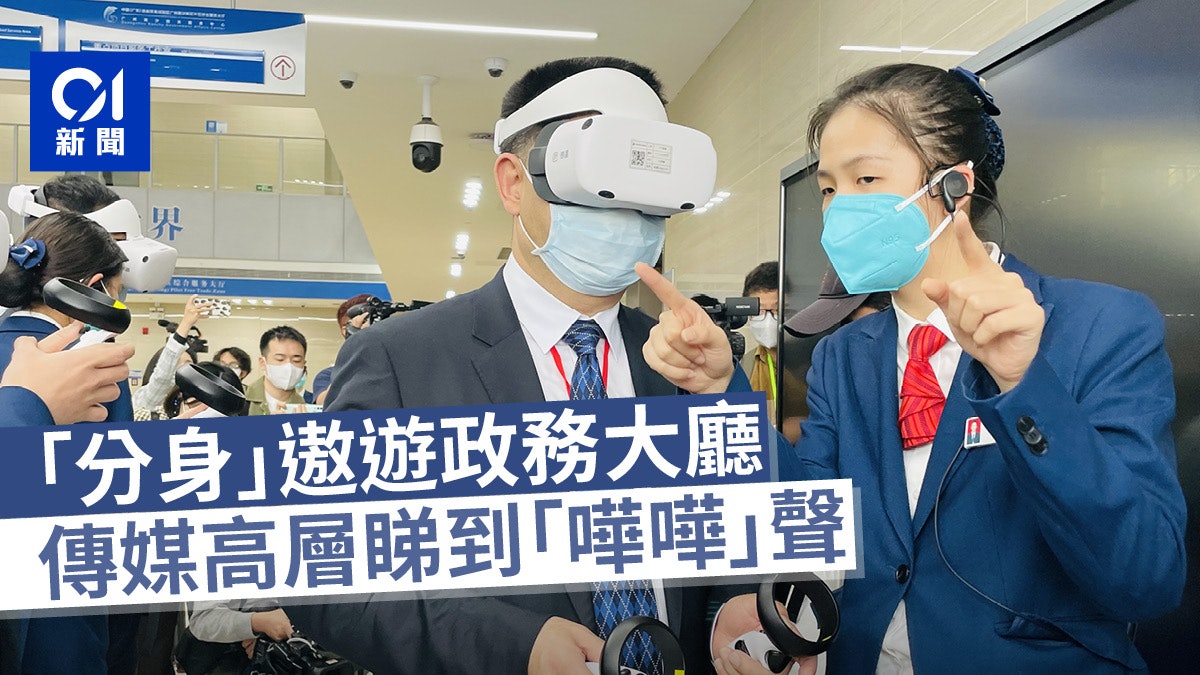Guangzhou, Shenzhen, Dongguan, what will everyone think of?
Huang Kunming, secretary of the Guangdong Provincial Party Committee, called for "recreating a new Guangdong" in the "high-quality development of a large number"; at the end of last month, Hong Kong media executives who visited Guangdong were the first to see the new Guangzhou, which is strengthening fine governance, and the new Shenzhen, which is transforming scientific research , New Dongguan of advanced manufacturing.
The group members let the "clone" break through the time and space boundaries to go through the formalities at the "Yuanyu" government affairs office in Nansha, Guangzhou; they were shocked by the 5-meter-high "patent wall" at the BYD headquarters in Shenzhen; Robot base, see the transformation of the city.
Bit by bit, it seems to remind us of the distance from the "smart city".
According to the staff of the Nansha "Yuan Universe" government affairs service center, the service aims to deeply integrate digital technology and government affairs platforms, change the traditional boring 2D model, allow the public to experience real perception in virtual scenes, and at the same time improve work efficiency and reduce work costs.
(Photo by Huang Yunna)
Do practical things in the virtual government affairs hall
"Wow!" Members of the high-level Hong Kong media delegation at the no-cabinet consultation desk of the Nansha Government Service Center in Guangzhou put on the VR glasses and immediately broke the limitation of time and space, allowing the "clone" to shuttle between the consultation station, the self-service area, and the service center. business window etc.
The visiting group was in the country's first "Yuan Universe" government affairs service center launched in October last year. Residents are allowed to sit at home and enter a 1:1 virtual government affairs hall. Empty for various administrative procedures.
At first glance, the service might seem like a gimmick.
After listening to the introduction of the center staff, I realized how innovative ideas and information technology are fully integrated into public services, how to improve the efficiency of resource utilization, optimize urban management, and improve the lives of citizens.
Technically, the service strengthens the security and application of data with a "decentralized organizational structure". It has the characteristics of high privacy, anti-attack, traceability, quick response, openness and transparency, and is the intelligence and governance capability of government services. important practice of modernization.
In terms of effect, the service deeply combines digital technology and government affairs platform to change the traditional boring 2D mode, allowing the masses to experience real perception in virtual scenes, saving waiting time, breaking through geographical boundaries, and improving work efficiency; Liberated from complex administrative procedures, optimized processes, improved quality and increased speed.
The Nansha District of Guangzhou launched the first "Yuan Universe" government affairs service center in the country, allowing residents to use the Internet to enter a 1:1 virtual government affairs hall even if they are sitting at home, and through immersive 3D images, they can handle various administrative procedures remotely .
(Photo by Huang Yunna)
"Digital government" is not just talk
Looking at the scene of the visiting group members eager to try, my mind is full of the scene of Hong Kong citizens queuing up to hand in government forms.
Not to mention, the authorities originally planned to implement the "Easy Pass" non-stop toll payment service in Tsingsha control area on February 26, but due to the hasty implementation and complicated procedures, for example, car owners are required to apply for vehicle stickers and open "Easy Pass" account, link the vehicle to the account, and set the automatic payment method; the result was confusion, a large number of drivers flooded into the customer service center, causing computer failure, and many elderly drivers failed to cross the digital divide. Finally, the authorities announced a temporary postponement until May 7, which became "Difficult to pass".
In fact, the SAR government has published the "Hong Kong Smart City Blueprint" and "Hong Kong Smart City Blueprint 2.0" in 2017 and 2020, and "Smart Government/Digital Government" is the focus; however, from the actual situation, The authorities are still in the stage of infrastructure construction, and have not yet fully accepted the electronic submission of government forms, let alone fully connected data and services from various departments.
At the end of last year, when the Information Technology Committee of the Legislative Council discussed government computer system funding, Lam Wai-kiu, Director of the Office of the Government Chief Information Officer, spent a lot of time defending the illusion that "PDF forms are already digitized", and said that the authorities still need two years at the fastest It will take time to fully implement the electronicization of government services.
Looking back, the SAR government paid attention to the development of e-government as early as 1998, and began to implement the electronic public service plan in 2000.
However, after more than 20 years of development, it is still mostly talk on paper, with limited real progress.
On the other hand, neighboring Guangdong Province has used big data to improve urban management and artificial intelligence to control the traffic system. Although it "lost at the starting line", it "wins on the runway", and all of this is due to local long-term planning, active implementation, and Efforts to achieve.
A large number of elderly people failed to receive the electronic consumer vouchers due to incorrect or missing information. Outside the secretariat of the Prince Edward Innovation Center, many citizens gathered in line to inquire and resubmit the forms.
(Photo by Zhang Haowei)
"Bureaucracy" limits our imagination
It turns out that since the "Report of the Nineteenth National Congress of the Communist Party of China" in October 2017 proposed to build a "network power, digital China, and smart society", Guangdong Province had passed the "Guangdong "Digital Government" Reform and Construction Plan" in December of the same year, and it will be launched in the following five years The "Guangdong Provincial Affairs" WeChat mini-program integrates the people's livelihood matters frequently handled by different departments into a unified platform for the whole province.
In the next few years, the Guangdong provincial government continued to strengthen the "Guangdong series" government service platform, and made persistent efforts to launch "Guangdong Shangtong", which facilitates enterprises from registration and business registration to tax declaration and tax payment; it can inquire about social security, household registration, transportation, pensions, etc. "Yuexingxin" which is the most concerned field of information; the first "Yueyouxing" which can display information including social security, license information, information navigation, medical epidemic prevention and other information on the built-in vehicle screen in the country; it is specially used for real-time "Yuezhengyi" for communication, sending and receiving official documents, holding meetings, and online training; of course, there are also many information platforms based on technologies such as the Internet of Things, big data, artificial intelligence, and 5G mobile communications to realize the integration of provincial governance. Cantonese Wisdom".
Today, first-tier cities, including Guangzhou, have put their efforts into implementing the concept of "digital government" in various scenarios, including updating more than 2,600 city data in real time, and handling more than 2,000 government services through apps.
As of October 2022, there are nearly 180 million real-name registered users who can handle 2,505 commonly used government services online, of which 1,097 are "zero-running" items, and there is no need to go to government departments to "run away" in person. trip".
In contrast, the SAR government only launched the one-stop personalized digital service platform "Smart Convenience" at the end of 2020. So far, only about 1.6 million registered users can log in and use more than 220 online services of the government and public and private organizations.
The "Guangdong Provincial Government Service "Good and Bad Evaluation" Management Measures" establishes a "good" or "poor" online and offline evaluation system for the systems, hotlines and service terminals that provide e-government services.
(Photo by Huang Yunna)
"Fingertip Revolution" throws away local governments
According to the summary of "E-government Measures and Applications of Selected Local Governments" released by the Data Research Group of the Legislative Council Secretariat in February this year, the "fingertip revolution" of Guangdong's e-government has three main highlights:
First, regarding the implementation structure, the authorities not only mobilized various government departments to cooperate, but also actively cooperated with private and state-owned enterprises.
In October 2017, the Guangdong Provincial Government led Tencent to invest jointly with the three major telecom operators in the Mainland to establish a joint venture company "Digital Guangdong Network Construction Co., Ltd." as the construction and operation center of the digital government, while the management positions are still in the charge of the government department .
As of October 2018, Guangdong Province has established the "Guangdong Provincial Government Service Data Administration Bureau", which is responsible for implementing policies to promote digital government construction, including integrating online government services, big data management, and solving overlapping problems.
By May 2021, Guangdong Province will take the lead in promulgating the draft regulations on the establishment of a "chief data officer system", responsible for coordinating data management and integration and innovation, supervising the implementation progress of government digitalization projects, and building a talent team.
Second, in terms of application concepts, the authorities have proposed "one-stop service" - which can be easily accessed through mobile electronic devices, so that enterprises and the public can handle government services; "one-net collaboration" - to facilitate public officials to make good use of digital tools to achieve cross- Regional, cross-level, and cross-departmental government affairs coordination; "one network unified management" - integrate various public administrative data resources, cover 5-level users provided by provinces, cities, counties, towns, and villages, and promote 3 Collaborative governance at all levels of government.
Third, in terms of performance measurement, the Guangdong provincial government is not sloppy.
In February 2020, the authorities issued the "Guangdong Provincial Government Service "Good and Bad Evaluation" Management Measures", establishing a "good" or "poor" online and offline evaluation system for systems, hotlines and service terminals that provide e-government services , to ensure that every government service, every institution, and every person is subject to evaluation; if a negative evaluation is received, a timely return visit is required for verification; if the evaluation is found to be true, rectification must be made within a time limit.
It is worth mentioning that the Ministry of Industry and Information Technology also conducts the "Digital Government Service Capability Evaluation and Government Website Performance Evaluation" every year, and evaluates the performance of each provincial government as excellent, excellent, good, or developmental. Guangdong Province has been rated as excellent for four consecutive years.
This is really unimaginable. If the Hong Kong government participates in the selection, it will lead to embarrassing results.
The SAR government has published the "Hong Kong Smart City Blueprint" and "Hong Kong Smart City Blueprint 2.0" in 2017 and 2020, and "Smart Government/Digital Government" is the focus; however, from the actual situation, the authorities are still in the infrastructure phase.
(profile picture)
If you have inherent advantages, you need to work hard the day after tomorrow
Under the "innate background", Nansha, as a national new area, a free trade zone, and the only sub-central city of Guangzhou, naturally shoulders the heavy responsibility of "digital"; but to become the first region in the country to implement metaverse government services, "acquired hard work" is still indispensable.
The "Outline Development Plan for the Guangdong-Hong Kong-Macao Greater Bay Area" announced in February 2019 further designated Guangzhou Nansha as a "technological innovation industry base" and a Guangdong-Hong Kong-Macao cooperation platform alongside Qianhai in Shenzhen and Hengqin in Zhuhai. In 2019, the Nansha government was also committed to building digital equipment, strengthening the soil for innovation and technology industries, optimizing the business environment ruled by law, and creating a high-quality humanistic life.
In June last year, the State Council issued the "Overall Plan for Deepening Guangdong-Hong Kong-Macao Comprehensive Cooperation in Nansha, Guangzhou", which further stipulated that until 2035, Nansha's innovative industrial system must become more mature, the transformation of scientific research achievements must be significantly improved, and the production and living environment must be improved day by day. , Public services must reach the world's advanced level, and the number of Hong Kong and Macao residents must increase substantially.
One month later, Nansha released the "Nine Measures to Promote the Ecological Development of the Metaverse in Nansha New District of Guangzhou (Nansha Free Trade Zone)", indicating that Nansha will be built into a highland for innovation and development of the Metaverse, and will tackle key technology problems and accelerate industrial agglomeration , Construct application scenarios, increase talent subsidies, strengthen financial support and other five aspects to promote the development of Metaverse industry.
Therefore, in October last year, the "Yuan Universe Government Affairs Hall" of the Nansha Government Affairs Service Center was launched quickly, becoming the first of its kind in the country. "Project Planning Permit" business; in the future, functions such as "one-to-one" real-time video customer service and "handling in Hong Kong and Macau" will be opened, so that residents in Hong Kong and Macau can also handle procedures directly in a one-stop, contactless manner .
Looking at Hong Kong again, it seems that there is no clear goal and implementation policy.
At the Legislative Council meeting on November 30 last year, Election Committee member Tan Yueheng asked Sun Dong, Secretary for Innovation, Technology and Industry in writing, whether Hong Kong would refer to the mainland government to formulate industrial policies and regulatory frameworks to promote the sound development of the metaverse; but the bureau only responded "The government has been paying close attention to the latest developments and applications in various fields of science and technology (including metaverse), and will formulate strategies and implement measures in due course."
The delegation was co-ordinated by the Liaison Office of the Central People's Government with Deputy Director Lu Xinning as an advisor. 18 mainstream media including "Hong Kong 01" were invited to participate. They visited Guangzhou, Shenzhen and Dongguan for three consecutive days (February 23-25) at the end of last month.















